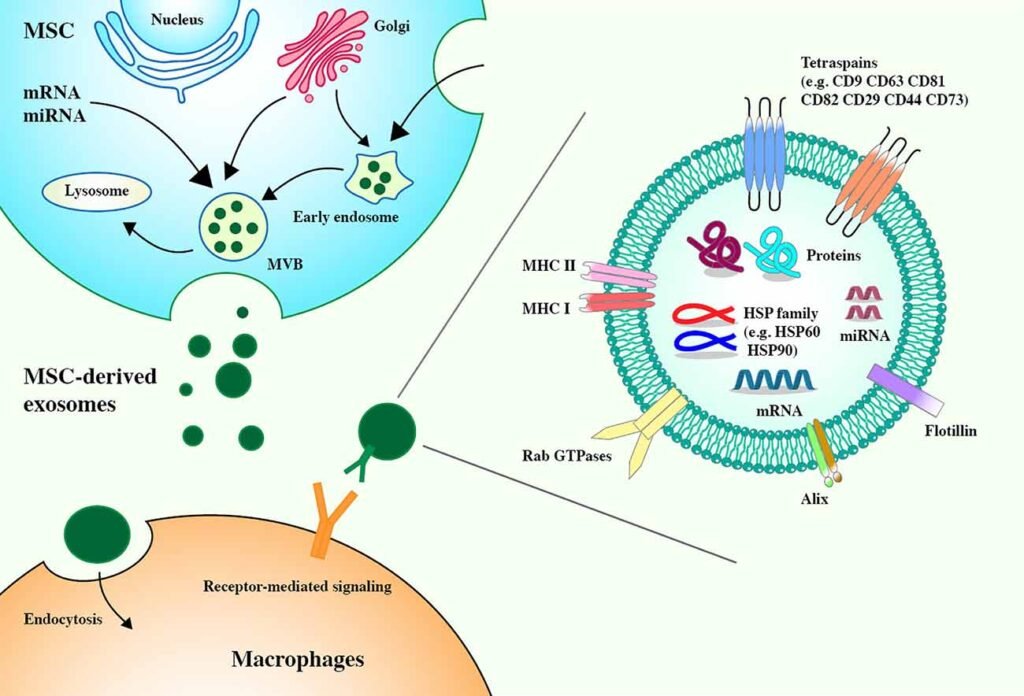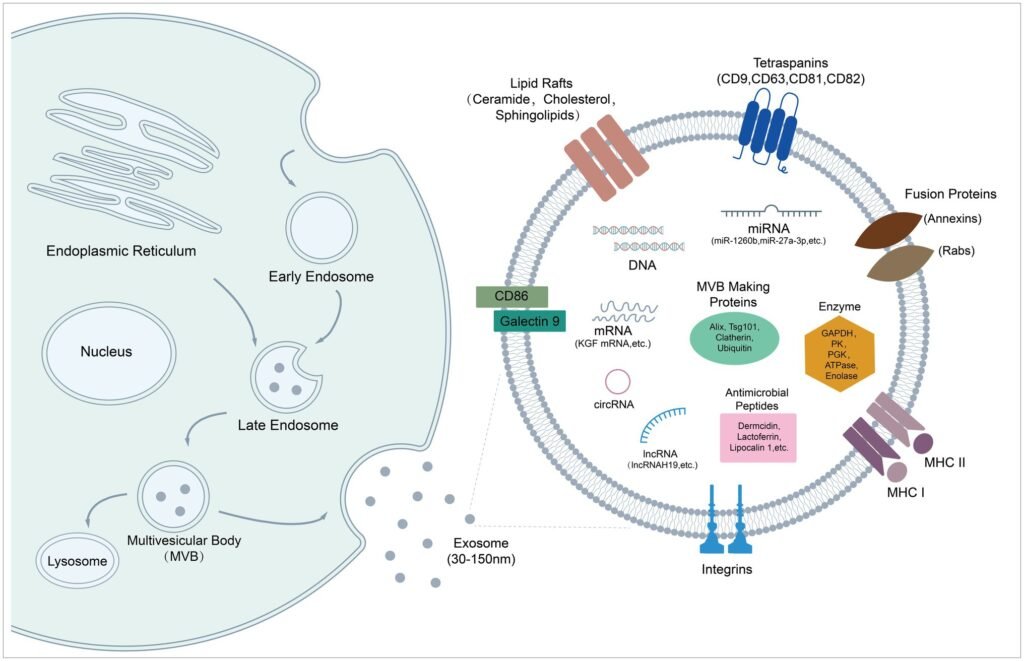Summary Exosomes and stem cells are two pivotal elements in regenerative medicine, but they are often confused with one another. In this article, we break down the differences and similarities between exosomes and stem cells, exploring how both contribute to cellular processes and their applications in medical therapies. You will gain insights into how these …
Summary
Exosomes and stem cells are two pivotal elements in regenerative medicine, but they are often confused with one another. In this article, we break down the differences and similarities between exosomes and stem cells, exploring how both contribute to cellular processes and their applications in medical therapies. You will gain insights into how these two work independently and together to promote tissue regeneration, healing, and even cancer research.

Introduction:
If you’ve ever wondered, are exosomes stem cells?, you’re not alone. These two biological entities are often discussed in the same breath, especially when it comes to advancements in regenerative medicine. While they both play critical roles in cell communication and healing, they are distinct from one another. In this article, we will explore the key differences between exosomes and stem cells, their roles in tissue repair, and how they are revolutionizing modern medicine. By the end, you’ll have a clear understanding of how these elements work together and individually to heal and regenerate tissues.
What Are Exosomes?
Defining Exosomes and Their Function
Exosomes are tiny, membrane-bound vesicles that range in size from 30 to 150 nanometers. They are secreted by most cells and contain various biological molecules such as proteins, lipids, RNA, and DNA. These vesicles play a crucial role in intercellular communication, transferring molecular signals between cells. By transporting these molecules, exosomes can affect the behavior of recipient cells and are involved in various physiological processes, including immune modulation, tissue repair, and even cancer metastasis.
How Exosomes Contribute to Cellular Processes
Exosomes facilitate the transfer of cellular material, allowing for the regulation of gene expression and protein synthesis in target cells. In tissues, they help with cell-to-cell communication, playing a role in immune responses, waste removal, and controlling inflammation. For example, in regenerative medicine, exosomes derived from stem cells can promote tissue regeneration by delivering growth factors, RNA, and proteins to damaged areas, aiding in the healing process.
What Are Stem Cells?
Types of Stem Cells
There are different types of stem cells, each with unique properties:
- Embryonic Stem Cells: These stem cells are pluripotent, meaning they have the potential to become any cell type in the body. They are derived from embryos at the blastocyst stage and are typically used in research settings.
- Adult Stem Cells: Also known as somatic or tissue-specific stem cells, these are found in various tissues like bone marrow and can only differentiate into cell types from their originating tissue.
- Induced Pluripotent Stem Cells (iPSCs): These are adult cells that have been reprogrammed to behave like embryonic stem cells. iPSCs are capable of developing into many different types of cells.
How Stem Cells Aid in Healing and Tissue Regeneration
Stem cells are remarkable for their ability to differentiate into various cell types. When injected into damaged tissues, they can generate new cells to replace those that have been lost or destroyed. This regenerative capability has made stem cells a cornerstone in treatments for conditions like osteoarthritis, heart disease, and neurological disorders. In fact, stem cells are used in clinical trials worldwide for spinal cord injuries, Parkinson’s disease, and even heart attacks.
Are Exosomes and Stem Cells the Same?
Key Differences Between Exosomes and Stem Cells
While exosomes and stem cells are both crucial in regenerative medicine, they are fundamentally different:
- Exosomes are extracellular vesicles, essentially tiny packages that carry information between cells. They don’t have the ability to replicate or differentiate.
- Stem cells, on the other hand, are living cells that can replicate and differentiate into various other cell types, making them capable of regenerating tissue and organs.
Do Exosomes and Stem Cells Work Together?
Yes, they often do. Exosomes are secreted by stem cells and carry many of the proteins, RNAs, and growth factors that stem cells produce. In fact, much of the regenerative potential of stem cells may be attributed to the exosomes they release. These exosomes can be used therapeutically on their own, as they contain many of the same factors as stem cells but are less invasive and easier to administer.
Applications of Exosomes in Medicine
Exosomes in Regenerative Medicine
Exosomes have found a promising role in regenerative medicine. Researchers have begun exploring their potential for promoting tissue healing in conditions like burns, cardiovascular diseases, and even hair restoration. Exosomes can help speed up recovery by promoting cell growth, tissue repair, and regeneration without the need for stem cell injections.
Exosomes in Cancer Research
Exosomes also play a role in cancer research. They can be used to carry RNA or protein-based therapies directly to cancer cells, bypassing the challenges associated with traditional treatments. This is an exciting development as it opens up new possibilities for targeted cancer treatments.
Stem Cell Therapies and Their Future

Stem Cells in Clinical Applications
Stem cell therapies are already in clinical use, helping patients with a variety of medical conditions. For example, bone marrow stem cells are used to treat blood cancers like leukemia. Mesenchymal stem cells (MSCs) are being studied for their ability to repair cartilage in joint diseases. The future of stem cell therapies is bright, with ongoing research aimed at expanding their uses for conditions like Parkinson’s disease, Alzheimer’s, and more.
The Potential of Stem Cells in Personalized Medicine
Personalized medicine is the future of healthcare, and stem cells play a central role. By using a patient’s own stem cells, doctors can offer treatments that are specifically tailored to their genetic makeup. This approach could dramatically reduce the risk of complications and improve the effectiveness of treatments.
Can Exosomes Replace Stem Cells in Therapy?
Pros and Cons of Exosomes vs. Stem Cells
Exosomes have the advantage of being less invasive and easier to deliver compared to stem cells. However, they lack the ability to regenerate tissues on their own, unlike stem cells. While exosome therapies can be effective in certain contexts, stem cells remain the preferred option for more complex regenerative treatments.
Combining Exosomes and Stem Cells for Advanced Treatments
The most promising treatments might come from combining both exosomes and stem cells. By leveraging the regenerative capabilities of stem cells along with the therapeutic potential of exosomes, doctors can create more effective treatments for a wide range of diseases.
FAQs
Are Exosomes Derived from Stem Cells?
Yes, exosomes are secreted by stem cells and contain many of the growth factors, proteins, and RNA that stem cells produce.
Can Exosomes Be Used Without Stem Cells in Therapy?
Yes, exosomes can be used independently in therapies, particularly for targeted delivery of proteins or RNA to cells in need.
How Are Exosome-Based Therapies Administered?
Exosome therapies can be delivered via injection, topical applications, or through specialized delivery methods depending on the treatment area.
Conclusion:
Exosomes and stem cells are both integral to the field of regenerative medicine, each with its own unique abilities. While exosomes are powerful for facilitating cellular communication and enhancing stem cell therapies, stem cells remain the gold standard for tissue regeneration and repair. By understanding their differences and how they work together, we can unlock new potential in treating diseases, injuries, and even reversing the effects of aging. Whether used separately or together, both exosomes and stem cells hold incredible promise for the future of medicine.
Call To Action
Curious about how exosomes or stem cells can help improve your health? Book a consultation with our specialists to explore advanced regenerative treatments tailored to your needs.





